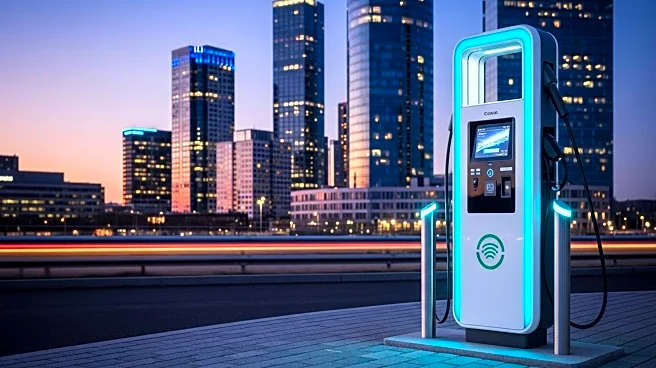What is the story about?
What's Happening?
Mercedes-Benz is advancing its commitment to emissions-free driving through the development of innovative charging technologies for electric vehicles (EVs). The company is testing its Experimental Lade Fahrzeug (ELF), an electric van designed to explore future charging solutions. This vehicle is equipped with both CCS high-power charging and MCS megawatt charging systems, as well as wireless charging capabilities. Mercedes-Benz is focusing on bi-directional charging, which allows EVs to absorb excess energy from renewable sources and feed it back into the grid, enhancing grid stability and energy security. The ELF serves as a test bed for both AC and DC vehicle-to-grid technologies, aiming to redefine charging protocols and improve the EV charging experience.
Why It's Important?
The development of advanced charging solutions by Mercedes-Benz is significant for the broader energy transition, as it positions electric vehicles as active participants in sustainable energy systems. Bi-directional charging can lead to greater independence for consumers and potential cost savings, while also supporting grid stability and the efficient use of renewable energy. This innovation could accelerate the adoption of electric vehicles by addressing common charging challenges and improving convenience for users. As Mercedes-Benz sets new standards for public charging, it could influence industry practices and encourage other automakers to invest in similar technologies, thereby advancing the global shift towards cleaner transportation.
What's Next?
Mercedes-Benz plans to launch its first services for bi-directional charging in Germany, France, and the UK by 2026, with other markets to follow. The company is also developing a new generation of high-performance fast chargers to be used at Mercedes-Benz charging parks. These developments are expected to offer customers faster charging times and greater flexibility, enhancing the overall convenience of electric vehicle ownership. As Mercedes-Benz continues to refine its charging technologies, it may collaborate with other industry stakeholders to further integrate EVs into the energy grid, potentially leading to new business models and partnerships.
Beyond the Headlines
The exploration of bi-directional charging by Mercedes-Benz highlights the potential for electric vehicles to serve as mobile energy storage units, contributing to the energy transition. This approach could lead to ethical and cultural shifts in how energy is consumed and managed, promoting sustainability and environmental responsibility. Additionally, the focus on automated and wireless charging systems could transform urban infrastructure and fleet management, making electric vehicles more accessible and convenient for a wider range of users.















